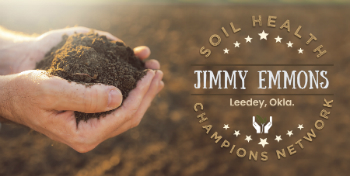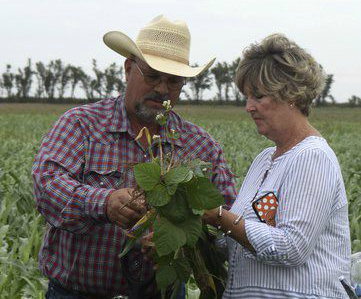
On April 22, Earth Day, the Oklahoma Cattlemen’s Association, Oklahoma Farming and Ranching Foundation, Oklahoma Association of Conservation Districts, Oklahoma State University, ITC Holdings Corporation, USDA NRCS and the Noble Research Foundation came together with the Sand County Foundation to award the first Leopold Conservation Award in Oklahoma to NACD Soil Health Champion Jimmy Emmons and his wife Ginger.
"To me, the Leopold is almost like winning the Nobel Prize," Emmons said. "It's the highest accolade out there for conservation and really sticks out to producers with good stewardship ethics. So, we're very humbled by that and honored to be a part of that process."

The Emmons operate a 100% no-till 2,000-acre farm and ranching operation in Leedey, Okla., where Jimmy is the third generation to farm this land. In the semi-arid landscape of the Great Plains, Emmons has been focused on rehabilitating the land – building healthy soils for a productive agricultural operation with fewer inputs such as fertilizer and insecticide, and less irrigation. Jimmy has been building a soil health system with many parts that all play a vital role, such as crop rotation, cover crops, no-tilling, pollinator strips, and rotational grazing of their cow-calf operation.
Jimmy and Ginger are generous with their time, experience and knowledge when it comes to conservation and soil health. Traveling all across the country, Emmons encourages his peers to step outside their comfort zone and try implementing some of these soil health practices with the assistance of their local NRCS office and conservation district. “The big thing about soil health is it works everywhere. You just have to manage your system for your precipitation and your atmosphere,” Emmons said. He and Ginger have also hosted many field days and demonstrations on their operation – giving producers, conservation professionals and many others a chance to see conservation practices in action, as well as the positive effects they have on the land.
Within a week of Emmons receiving the Leopold award, his operation was severely impacted by the Rhea wildfires that devastated Oklahoma and Kansas. Roughly half of Emmons’ 6,500 acres of rangeland were burned during the fires that broke out in western Oklahoma due to the drought. Despite the catastrophic damage he and his family are experiencing, Emmons remains positive and is confident the conservation practices he implemented not only prevented the fire from doing more damage on his operation, but will decrease the recovery time.
“Back in 1926, we managed our brush to create a fire break using Eastern red cedars,” Emmons said. “This prevented the wildfire from spreading further on our property, and the managed brush made it easier for firefighters to reach as opposed to those who hadn’t managed their brush. I am confident the management practices we’ve implemented on our rangeland have resulted in better soil and better water holding capacity, so it will recover quicker, and we’re already seeing that. On my own operations, I can tell where we’ve done a better job managing the rangeland – grazing, high-stock density and the better soil health. We’re seeing the grass coming back from the burn quicker than in the areas that we haven’t managed as well. So, I know what we’ve been preaching and practicing is really making the difference there.”
To learn more about Jimmy and Ginger Emmons’ operation, be sure to watch this video on the 2017 Leopold Conservation Award in Oklahoma and check out his NACD Soil Health Champion profile. If you or someone you know would like to know more about the NACD Soil Health Champion Network, please contact NACD North Central Region Representative Beth Mason at beth-mason@nacdnet.org or 317-946-4463.